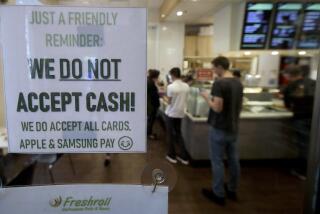Legitimate Reasons Do Exist for Merchant Preference for Cash Rather Than Checks
- Share via
Q. My mechanic recently told me he would offer a discount on his bill if I would pay in cash rather than by check. He already imposes a 2.5% fee on any credit card transactions, which I can understand since the credit card company assess merchants a service charge. But I can’t understand why he doesn’t want to accept checks from a customer who has never bounced a check with him or anyone else--ever. When I asked the mechanic his reasons for wanting cash, he said only that it was “more convenient” for him.
I always thought checks were considered as good as cash (at least from trusted customers). Now I am left thinking that he may want cashto hide income from the government. Is there another possible conclusion?
--S.C.
*
A. There are several possible reasons your mechanic prefers cash, all of them legitimate. However, banking and consumer authorities said the most common reason is the very one you suspect: avoiding the tax collector for both sales and income taxes.
What legitimate reasons could your mechanic have for preferring cash? It might be that he’s been burned too many times by bounced checks, especially on particularly expensive repair bills. Or he could be trying to reduce or avoid the fees banks are increasingly imposing on business checking accounts.
However, as you well know, merchants can check with banks about a customer’s checking account status to determine if there are sufficient funds to cover the bill. Further, customers who have a long-standing relationship with a merchant, as you apparently do, have already proved their credit-worthiness. And it does seem unlikely that a merchant would prefer to run the security risk of holding large wads of cash to paying, at the very most, $10 to $20 per month for a business account.
One reason a customer might have for not wanting to pay a repair bill by cash, suggests Ken McEldowney of Consumer Action in San Francisco, is that it could reduce your negotiating power with your mechanic if you are unsatisfied with your repairs. After all, if you are dissatisfied with the service you have received, you can stop payment on your check. It’s not as easy or cheap as challenging your credit card bill, but it is more clout than if you’ve paid in cash.
Ex-Worker Not Eligible for 2nd Jobless Claim
Q. What are the requirements for filing a second claim for unemployment insurance at the end of a benefit year? My 26 weeks of benefits have run out and I am still unemployed. May I still file a claim even if I haven’t worked in a year? Before this stretch of unemployment, I had worked in California and my employers had paid into the unemployment fund on my behalf for more than 40 years.
--M.H.
*
A. According to the state Employment Development Department, California residents are currently eligible for just a single 26-week unemployment insurance claim between jobs. Perhaps you recall the “extended unemployment benefits” program that has periodically been available during tough economic times. These permit a second 26 weeks--but are not currently available.
In order for you to qualify for a new claim, you must get a job. Or, as an EDD official phrased it, you must “show an attachment to the labor market.”
According to EDD regulations, you must have at least $1,300 in earnings in one quarter of your base employment period (a 12-month period ending approximately 18 months before your claim) or at least $900 in earnings in the highest quarter and total base period earnings of 1.25 times your high-quarter earnings.
Unfortunately, this is the ultimate Catch-22. To qualify for unemployement, you must have a job. But if you had a job, you wouldn’t need unemployment insurance (or at least not right away).
Ceilings and Floors for Social Security Benefits
Q. Is there a minimum and a maximum Social Security benefit for retirees? How is it determined?
--M.G.
*
A. Social Security benefits are based on a wage earner’s highest 35 years of contributions into the Social Security system. According to a spokesman for the Social Security Administration, there is no longer a minimum or floor payment. Using computations based on possible payments into Social Security during a wage earner’s minimum required 40 quarters, or 10 years, of contributions, the administration came up with a potential minimum $13 monthly payment for a mythical Social Security recipient. However, the spokesman cautioned that a particularly low-wage earner might be eligible for even less.
There are however, maximum benefit amounts. For example, a wage earner retiring in 1996 at age 65 can receive a maximum of $1,248 per month. Spouses can receive additional amounts as well.
More to Read
Inside the business of entertainment
The Wide Shot brings you news, analysis and insights on everything from streaming wars to production — and what it all means for the future.
You may occasionally receive promotional content from the Los Angeles Times.










